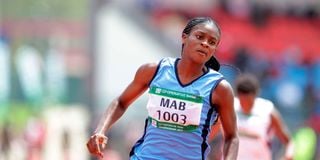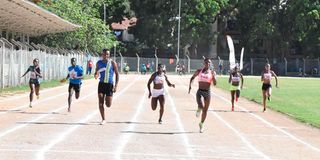Women sprinters Nusra, Mbagari harbour Olympic Games dream

Rukia Nusra crosses the finish line to win women's 100m final race during Kenya Defence Forces (KDF) Athletics Championship at Ulinzi Sports Complex in Nairobi on May 26, 2023.
What you need to know:
- Mbagari opines for the creation of female-only training camps to draw more numbers to athletics besides reducing charges levied for training at public faculties.
- “Not everyone can afford Sh200 charged daily for training at the Nyayo or Kasarani stadia,” says Mbagari, adding that the country can produce many Ferdinand Omanyalas if given opportunities and facilities.
They are young, aggressive and hungry for success. Is this the super duo that could redefine women’s sprinting in the country?
Though pursuing different races, the young and exuberant Esther Mbagari, 23, and Rukia Nusra, 22, who have taken the local scene by storm over the last two years have one thing in common.
The two national champions are on a mission that could see the country end the long 36 years wait to have female sprinters at the Olympic Games.
The last appearance at the Olympics by Kenyan female sprinters was at the 1988 Seoul Olympics Games where Rose Tata-Muya competed in 400m hurdles and Joyce Odhiambo in 100m and 200m.

Esther Mbagari of Prisons (third right) wins the 100m women's final race during the fourth leg of the Athletics Kenya Track and Field Meeting at Mbaraki Sports Club, Mombasa on April 1, 2023.
Odhiambo failed to go past the first round of her two races, clocking 11.90 seconds and 24.26s with Tata-Muya also encountering similar fate in 400mh with a time of 56.18.
Kenya was first represented by female sprinters at the Olympics during the 1968 Mexico City Games where Lydia Stephens competed in 100m with Tekla Chemabwai running in 400m.
Ruth Waithera (400m) and Tata-Muya (400m hurdles) made it to the 1984 Atlanta Olympics.
Nusra, who won her maiden national 100m hurdles title last year in a Kenyan record 13.87 seconds at the Nyayo National Stadium, broke the record again with a time of 13.70 at the Third Athletics Kenya Track and Field Meeting on January 26 at the same venue.

Rukia Nusra crosses the finish line to win women's 100m final race during Kenya Defence Forces (KDF) Athletics Championship at Ulinzi Sports Complex in Nairobi on May 26, 2023.
Nusra will be eyeing to make history as the first Kenyan woman to compete in 100m hurdles at the Olympics.
On the other hand, Mbagari claimed the national 100m and 200m titles for the first time last year, ending Maximilla Imali’s dominance.
Mbagari now hopes to become the only other Kenyan woman to have competed at the Olympics in 100m and 200m after Odhiambo at the 1988 Seoul Summer Games.
Qualifying window
Nusra, 22, and Mbagari, 23 were speaking during NTV’s Monday night live sports show SportOn!, hosted by Bernard Ndong and James Wokabi.
“I have high hopes of making it to Paris since the qualifying window is still open,” says Nusra, who has been using the 100m and 200m races to refine her speed in pursuit of qualification.
Nusra reveals that she has several races lined up in Croatia, Spain, Germany, and Belgium in her quest to meet the Paris Olympics qualifying standards of 12.77 seconds.
“If I fail to hit that time, then clocking 13.0 or 12.90 will be enough for me to qualify through the world ranking. Competing in Europe against athletes who are stronger than me will push me to the limit,” says Nusra, the 2021 world shuttle relay bronze medallist, adding running flat races especially 100m will help her get speed.
“Clocking 11.30 in 100m can easily achieve 12.3 in 100mh and doing 11.8 in 100m gave me the national record of 13.70,” notes Nusra, whose hunger and drive for individual sports saw her switch from basketball to hurdles.
“Kenyan female sprinters too need a permanent place either at the Olympics or World Championships,” states Nusra.
“I am working on my starts and speed since I am confident that I will strike the Olympic qualifying time of 11.07...it is achievable,” says Mbagari, who ran her personal best of 11.60 when winning the Third Athletics Kenya Track and Field Meeting on January 26 this year at the Nyayo National Stadium.
Interestingly, Mbagari, who is currently ranked 14th in the world in 100m, prefers the 200m to the 100m, and pursuing an Olympics qualifying mark of 22.57 in 200m could give her a double edge at the Paris Summer Games.
Adrenaline person
“You see most of my colleagues don't like the 200m because of its endurance aspect, but that is what makes me tick. It’s the pathway to performing well in 100m,” intimates Mbagari, the former football player, who only took up athletics seriously in 2021.
Why sprints?
“Am an adrenaline person...I like being aggressive and that is why I took up basketball first before shifting gears,” reveals Nusra, who embraced sports at Mumias Central Primary School where she cleared in 2015.
“I wasn’t satisfied with basketball since I wanted a sport where I could manage alone, not as a team.”
Nusra explains she considered running in 100m and 200m, but the two events were full hence her decision to settle for the 100m hurdles that had few people.
Nusra, who took up sports from her father, Hajji Adede, a former footballer and Fifa Referee, made it to the 2015 National Primary School Championships in Kisii.
“I won silver and it took me by surprise...I told myself this is it! It wasn’t that hard because I had the speed and agility from basketball,” says Nusra, who attributes her rise to her father.
Even after St Francis Rangala Secondary School in Siaya, Nusra’s father dug deep on the internet to share with her video clips of some of the world’s best female hurdlers, hence Rukia’s love for American Kendra "Keni" Harrison, who claimed silver medals from the 2019 Doha world and 2020 Tokyo Olympics.
“Through my dad, I learnt how to position my trail leg and lead legs and attack the hurdles,” says Nusra, who represented Kenya in 110mh at the 2017 World Athletics Under-18 Championships held at Kasarani, Nairobi.
“I started using running spikes when I was still at primary school and thanks to my parents who embraced both education and sports. I was the only one among my siblings to take up sports,” explained Nusra, who failed to go past the last round.
Then Nusra would lose interest in the sport, especially after clearing high school in 2019, the year that she won the National Secondary Schools 100m hurdles title.
Fearing her talent could go down the drain, Rukia, who had started gaining weight, contacted one of Kenya’s finest sprints coaches, Vincent Mumo, who would help her reinvent her wheel right on time for the 2021 World Relay Championships in Poland.
Rukia’s team of Priscilla Tabunda, Wiseman Were and Michael Musyoka settled for bronze in the shuttle relay event.
“The event happened after winter and it was a bit cold. It was really difficult for us since we had not carried winter clothes,” recalls Nusra.
“Nevertheless, it was a good experience since I got to meet some of the best hurdle athletes.”
Even though Mbagari used to compete for her schools Ivakali Primary and Secondary School where she competed in 2020, she only took athletes seriously last year.
“I first took up football as a striker before my secondary school teachers encouraged me to pick up athletics owing to my speed,” says Mbagari, who reached the nationals in her final year during the 2019 secondary school games.
Then Mbagari visited her relatives at Industrial Area Prisons in Nairobi in 2021 where one of them, Mauren Wafula encouraged her to attend one of the Kenya Prisons Athletics team training sessions at the Nyayo National Stadium.
“It was a culture shock for me. It was the first time I saw a modern tartan track and running spikes. I ran barefoot at the nationals,” reveals Mbagari, who got to meet his current coaches Steven Mwaniki and Wellington Nyakundi.
“The rest is history,” intimates Mbagari as her journey to athletics peak started in earnest with several weekend meetings before the 2022 national championships where she reached the finals of the 100m and 200m to finish fourth in each event.
Nusra is now seeking inspiration from the 2022 World and Commonwealth Games 100mh champion, Nigerian Tobi Amusan to scale to greater heights.
Amusan, who is also the reigning African champion, is the current 100mh world record holder.
“I just like Tobi’s progression from 13.89 in 2014 to 12.12 in 2022. We both have right leg lead and I hope that I will be as swift and explosive as she is. Tobi isn’t that typical hurdler,” notes Nusra.
Mbagari wants to emulate her role model, world 100m champion Sha'Carri Richardson from the United States of America in her quest for the Paris Olympics, having missed last year’s world championships in Hungary.
“Sha’carri is elegant, domineering, and brave in her running. Her first 30m and top-end speed are quite powerful, hence something to learn from her,” said Mbagari, who is also a great admirer of the multi-Olympic and world champion, Jamaican Shelly-Ann Fraser-Pryce.
Nusra wants more women to take up sprints but hastens that it can only happen if more women are taking up sprints coaching.
“Most girls fear taking up the sport since we only have men as coaches. The landscape could change drastically if we are to encourage women to take up coaching and this needs affirmative action from athletics authorities, “says Nusra, adding that being active has helped her tame her asthmatic condition.
“I rarely experience attacks when I am active ...they only resurface when on recess and that is why I keep training,” says Nusra, who also wants local facilities improved for sprinters, adding that good facilities will end the exodus to foreign countries for training.
“We shall draw into the country top sprinters with good facilities in place. Right now, it’s only Nyayo National Stadium that is open, hence leading to congestion with other public venues closed,” says Nusra, noting that it’s sad that the country doesn’t have a qualified and professionally trained hurdles coach.
Mbagari opines for the creation of female-only training camps to draw more numbers to athletics besides reducing charges levied for training at public faculties.
“Not everyone can afford Sh200 charged daily for training at the Nyayo or Kasarani stadia,” says Mbagari, adding that the country can produce many Ferdinand Omanyalas if given opportunities and facilities.





